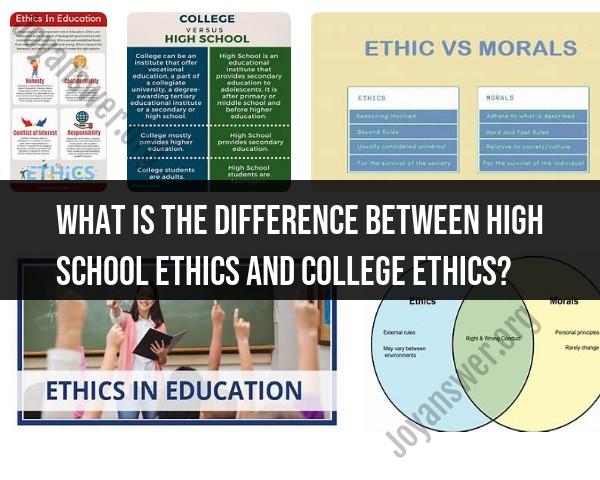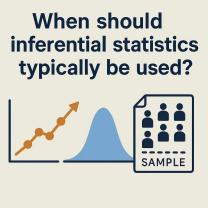What is the difference between high school ethics and college ethics?
The difference between high school ethics and college ethics courses lies in the depth, complexity, and focus of the content, as well as the expectations placed on students. Here are some key contrasts:
Depth of Exploration:
- High School: High school ethics courses often provide a broad introduction to ethical principles, basic theories, and moral reasoning. The emphasis is on building a foundational understanding of ethical concepts.
- College: College-level ethics courses delve deeper into philosophical theories, applied ethics in various fields, and complex ethical dilemmas. The coursework is more intellectually challenging and may require critical analysis and synthesis of diverse perspectives.
Focus and Specialization:
- High School: High school ethics education may be part of a broader philosophy or social studies curriculum. Courses tend to cover general ethical principles without a specific focus on specialized areas.
- College: College ethics courses may offer more specialized content based on the field of study. For example, business ethics, medical ethics, environmental ethics, or technology ethics courses may be available.
Critical Thinking and Analysis:
- High School: High school ethics courses often introduce students to critical thinking skills and moral reasoning. Students may engage in discussions and basic analysis of ethical scenarios.
- College: College-level courses place a greater emphasis on developing advanced critical thinking skills. Students are expected to analyze complex ethical issues, evaluate competing perspectives, and articulate well-reasoned arguments.
Research and Application:
- High School: High school ethics courses may focus more on theoretical concepts and discussions rather than extensive research or real-world application.
- College: College ethics courses often involve research assignments, case studies, and the practical application of ethical principles to real-world scenarios. Students may be required to engage with current ethical debates and apply theories to specific contexts.
Independence and Responsibility:
- High School: High school students typically have more structured environments, and coursework is guided by teachers. There is a higher level of oversight and support.
- College: College students experience greater academic independence and are expected to take more responsibility for their learning. They may have more freedom to explore specific areas of interest within the broader field of ethics.
Interdisciplinary Approach:
- High School: High school ethics education may be integrated into broader subjects like philosophy or social studies.
- College: College-level ethics courses may take an interdisciplinary approach, connecting ethical principles with various academic disciplines and professional fields.
Preparation for Specialized Professions:
- High School: High school ethics education serves as a general introduction and may not specifically prepare students for ethical considerations in particular professions.
- College: College ethics courses, especially in specialized fields, often prepare students for ethical challenges specific to their chosen professions. For instance, business students may study business ethics, while medical students may study medical ethics.
In summary, while high school ethics courses aim to introduce fundamental ethical concepts, college-level courses provide a more in-depth and specialized exploration, emphasizing critical thinking, research, and practical application within specific academic and professional contexts. The transition from high school to college involves an increased level of academic rigor, independence, and a focus on preparing students for more complex ethical challenges.
What distinguishes the study of ethics between high school and college levels?
The study of ethics undergoes a significant shift between high school and college, transitioning from basic introduction to more complex and nuanced exploration. Here are some key distinctions:
Depth and Complexity:
- High School: Ethics often focuses on basic moral principles, right vs. wrong, and simple case studies. The emphasis is on developing a fundamental understanding of ethical concepts like fairness, honesty, and responsibility.
- College: Ethics delves deeper into diverse ethical theories, their strengths and weaknesses, and their application to complex real-world situations. Students critically analyze arguments, consider different perspectives, and explore the nuances of ethical decision-making.
Critical Thinking and Argumentation:
- High School: Ethics tends to emphasize memorization of principles and application to straightforward scenarios. Critical thinking and argumentation skills are introduced, but not extensively developed.
- College: Students are expected to critically analyze ethical theories, identify assumptions, and construct reasoned arguments based on evidence and logic. They learn to engage in respectful dialogue with diverse viewpoints.
Focus and Application:
- High School: Ethics may be taught as a standalone subject or integrated into other courses like social studies or literature. Applications are often theoretical or hypothetical.
- College: Ethics courses often specialize in specific areas like business ethics, medical ethics, or environmental ethics. Students learn to apply ethical principles to real-world challenges and dilemmas relevant to their chosen field or personal life.
Methodology and Resources:
- High School: Teaching methods may rely on lectures, discussions, and basic case studies. Resources are primarily textbooks and teacher-provided materials.
- College: Courses utilize diverse methods like independent research, debates, simulations, guest speakers, and in-depth case studies. Students access a wider range of resources, including academic journals, specialized databases, and primary sources.
Overall, the study of ethics in college becomes more:
- Theoretical and analytical: Students engage with complex theories, arguments, and justifications.
- Critical and reflective: They learn to question assumptions, analyze evidence, and form independent judgments.
- Applied and practical: Students explore real-world applications of ethics and develop skills for ethical decision-making in diverse contexts.
- Specialized and in-depth: Courses focus on specific areas of application and research, allowing for deeper understanding.
It's important to remember that these are general trends, and individual experiences may vary depending on the specific high school and college courses, teachers, and curriculum. However, the transition from high school to college ethics typically represents a significant step towards a more mature and nuanced understanding of ethical principles and their application in the complex world around us.
I hope this helps! Feel free to ask if you have any further questions about specific aspects of ethics education at different levels.












